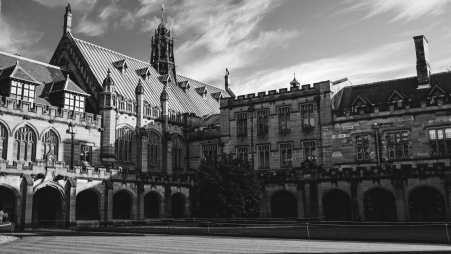In the last two years, Sydney’s universities have had to adapt to a world where the established teaching methods aren’t possible. Many fear that the pandemic has allowed universities to make unchecked changes to the quality of tertiary education and occupations.
Student investigations at the University of Sydney (USyd) and the University of New South Wales (UNSW) showed that the institutions engaged in extensive content restructuring.
Clair Oh headed the student investigation at USyd, finding leaked documents that showed 1 in 3 undergraduate subjects from the Faculty of Arts and Social Sciences are in danger of being cut.
These changes were drafted as cost-cutting measures despite the faculty forecasting a surplus of $135 million in 2021.
“They've always wanted to reduce the amount of courses, especially in the arts at USyd as it's the biggest, most diverse arts course offering,” said Oh.
A similar investigation into UNSW’s 2022 Handbook found that over 600 of the 3000 listed courses will not be taught next year.
Dr Sarah Attfield is the University of Technology Sydney (UTS) branch president for the National Tertiary Education Union. She believes that the universities’ decisions have utilised the pandemic to make more extensive cuts than required.
“Have the universities taken advantage of the pandemic to make some changes? I think they probably have,” said Dr Attfield.
“It's hard not to think that in some way the idea of efficiency, and reducing costs, always seems to be there in the background."
“It has huge implications for people's workload. If your colleagues have been made redundant, the work is still there. So, it's not like the universities are saying, ‘Okay, this work doesn't exist anymore.’ It does, and somebody has to do it.”
“It has diminished the quality of what we've been able to do.”
Despite this Dr Attfield said teachers have been warned of further job cuts.
“We think making staff redundant now is a very short-sighted thing to do, especially since we're in a better financial position now compared to what we thought we'd be in.”
Laying Down the Law
For students and employers, there are new fears that graduates will be underprepared for professional careers. Law students across the state are now wondering if their degrees will be eligible at all.
Kurt Cheng is the Vice President of the UTS Student Law Society and a member of the UTS Faculty of Law Board. Cheng is aware of concerns surrounding the quality of lawyers the universities are producing.
“No generation of lawyers has ever learned online for most of the degree,” said Cheng
The New South Wales Society of Law regulates the state's law degrees. Without their approval, universities cannot offer law certifications.
“They have very specific mandates that all exams must be in person, handwritten, in rooms of hundreds of people,” Cheng said.
With degrees being moved online due to COVID-19, lectures, classes, and exams were forced to be done at home. The mandates were altered to accommodate for the lockdown. However, when Sydney began to reopen, UTS’ Law degree stayed online.
“[The Law Society] said to us, ‘It's been a year and a half of online exams. We want a return to in-person exams. We are concerned about the quality of lawyers that your graduates will become.’”
Online law exams have their own issues. Many were designed to be completed over 48 hours. First-place law student at UNSW, Stella Wailes, says that the exams have impacted her stress levels.
“They say it's meant to be done in two hours, but you never spend that time on it. It creates the constant feeling that, for those 48 hours, you cannot fully relax,” Wailes said.
UNSW’s Faculty of Law prides itself on its small classes. However, like many courses, COVID-19 saw an increase of class sizes.
Katherine Wong is the Managing Editor of UNSW’s Tharunka. She has done extensive research into UNSW’s class sizes.
“Seminar sizes have been increasing. You have too many students who aren't able to get that same experience, and their learning is compromised.”
Rethinking Education
Claire Marshall is an innovative futurist and UTS academic for the faculty of Transdisciplinary Innovation. She believes that while change is painful, tertiary education could be facing an era of positive transformation, if done right.
“We should be encouraging and empowering students, more than teaching them,” Marshall said. “We don’t have to choose between conceptual and practical."
Marshall believes that we should “hospice out” the old ways of teaching so new styles, such as blended learning, can be welcomed in.
With this transition to blended learning, “engagement is something that we've had a problem with,” said Adam Bridgeman, Pro-Vice Chancellor for Educational Innovation at the University of Sydney.
The Student Experience Survey 2020 noted a 16% decline in learning engagements amongst students aged 25 and under.
“It’s not the screen; it’s the content on the screen… You can fall in love online. We just need to work a bit harder. We need to break the mould,” said Marshall.
Marshall talks of this shift to online learning as “rethinking systems” and one that requires experimentation and exploration.
“I think that’s how we will progress society, one little, failed experiment at a time.”
“I don’t think online learning has to be worse than face to face. But I do think it has to be different.”


 -
-